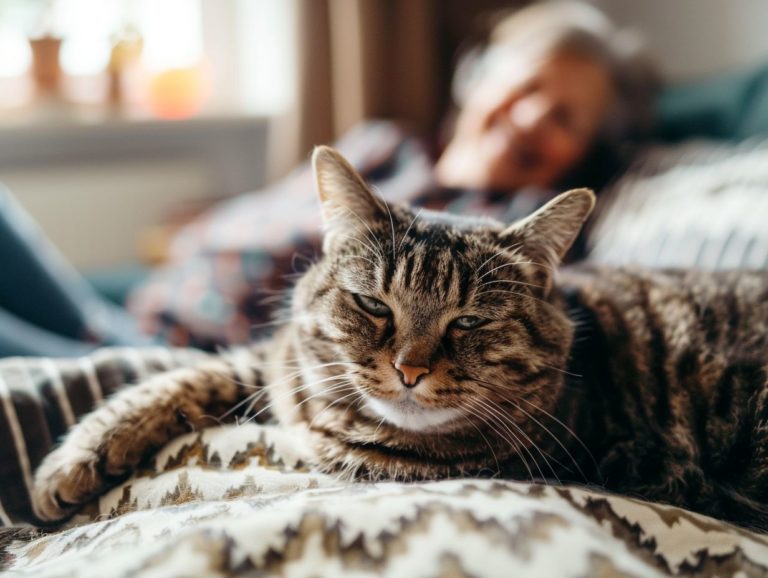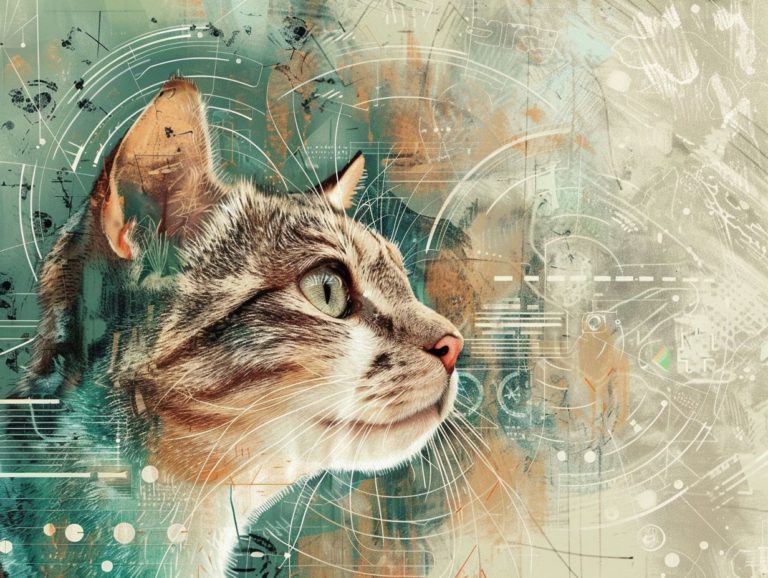How Insurance Can Help Manage Senior Cat Diabetes
As cats age, they become more susceptible to health issues like diabetes. Understanding the impact of diabetes on senior cats is crucial for their well-being. This article explores what diabetes in cats entails, its effects on older felines, and optimal management strategies through insurance.
Emphasizing the significance of proper diet, exercise, regular veterinary check-ups, and the potential benefits of pet insurance in covering diabetes treatment and other needs for senior cats. By the end of this piece, readers will gain insight into enhancing the quality of life for their senior diabetic feline companions.
Key Takeaways:
Understanding Senior Cat Diabetes
Understanding Senior Cat Diabetes is crucial for properly caring for mature feline pets. Specialized care and treatment are essential for managing diabetes in cats, particularly senior cats, in order to ensure they can live their best lives.
What is Diabetes in Cats?
Diabetes in cats is a group of complex diseases characterized by persistently elevated blood sugar concentrations due to the body’s inability to process glucose normally. It often requires insulin therapy and management to control and reverse the negative effects on a cat’s health and well-being.
Some of the most common causes of diabetes in cats are obesity, genetic predisposition, and a sedentary lifestyle. Symptoms of diabetes in cats can include polydipsia (excessive thirst), polyuria (increased urination), weight loss despite a good or increased appetite, and lethargy.
Diagnosis of diabetes in cats typically involves blood tests to measure glucose concentrations and a thorough assessment of the cat’s overall wellness status. Insulin therapy is crucial for managing diabetes in cats as it helps control blood sugar concentrations. Without careful monitoring, cats with diabetes may experience complications such as hypoglycemia (low blood sugar), insulin resistance, and ketoacidosis.
Regular veterinary check-ups and adherence to insulin and feeding protocols are essential to prevent or minimize these risks.
How it Affects Senior Cats
Diabetes can significantly impact the health of senior cats, leading to complications such as weight loss, increased urination, and a potential decline in overall quality of life. Managing diabetes in older cats is more challenging, requiring regular monitoring of blood glucose levels for successful treatment. Along with medications prescribed by a veterinarian, a proper diet tailored to the unique needs of diabetic cats is essential for managing the condition. Encouraging regular exercise can aid in regulating blood sugar levels and enhancing overall health. Pet owners must stay alert for signs of hypoglycemia in their senior diabetic cats, such as weakness or disorientation, as prompt intervention is critical.
Managing Senior Cat Diabetes
Proactive management of senior cat diabetes involves a combination of appropriate diet, regular exercise, attentive veterinary care, and timely treatment interventions. Active care is essential for maintaining the health and wellness of diabetic senior cats.
Diet and Exercise Recommendations
Managing diabetes in cats involves effective treatment methods such as diet and exercise. Customized meal plans, weight loss management strategies, and controlled physical activities all contribute to lowering blood sugar levels and improving overall health in diabetic cats.
By feeding diabetic cats high-protein, low-carbohydrate diets under the supervision of veterinarians, cat owners can better regulate their cat’s glucose levels. Regular, controlled exercise like interactive play sessions and short outdoor walks can aid weight loss and improve insulin sensitivity.
Monitoring and controlling food consumption, as well as ensuring proper hydration, are essential aspects of treating diabetes in cats. Alongside diet and exercise, lifestyle changes such as reducing stress and maintaining a peaceful environment are important for successfully managing diabetes.
Taking a holistic approach that includes proper diet, exercise, and a stress-free environment can help diabetic cats lead healthy and happy lives.
Importance of Regular Veterinary Care
Regular veterinary care is crucial for managing diabetes in cats as it enables early diagnosis, timely treatment adjustments, and optimal therapeutic interventions. Neglecting proper veterinary care can have adverse effects on senior cats with diabetes.
These routine visits enable veterinarians to monitor blood glucose levels, evaluate the effectiveness of insulin therapy, and identify early signs of potential complications. Timely diagnosis and proactive management of diabetes in cats lead to improved quality of life and increased life expectancy.
Veterinarians offer guidance on dietary management, exercise routines, and lifestyle modifications to support the well-being of diabetic cats. This enables cat owners to develop tailored care plans that address each cat’s individual needs and provide the highest level of care possible.
How Insurance Can Help
Insurance can be valuable in covering the medical treatment and care costs for senior diabetic cats. When pet insurance policies include coverage for diabetes-related expenses, they alleviate the financial strain and ensure that the cats receive essential veterinary treatment.
Coverage for Diabetes Treatment
Pet insurance coverage for diabetes treatment in cats typically encompasses the expenses related to insulin, veterinary consultations, diagnostic tests, and prescription medications. It is crucial to understand the extent of the coverage for effective financial planning.
Insurance plans tailored for cats with diabetes often include various aspects of treatment, such as blood glucose monitoring equipment, emergency care, and specialized diets. While having coverage can alleviate some financial strain, pet owners should familiarize themselves with the specifics of their plan to understand any exclusions or limitations that may be in place.
Some insurance plans may also provide benefits like coverage for diabetes-related complications, enhancing the overall value of the plan.
Other Benefits of Pet Insurance for Senior Cats
Pet insurance for senior cats, in addition to covering diabetes, can also assist with managing chronic health conditions such as heart disease, kidney failure, and cognitive dysfunction. This provides a level of financial support and peace of mind for a more comprehensive treatment plan.
These insurance options are particularly valuable for senior cat owners, as older cats often develop age-related health issues that require ongoing management and treatment. By covering chronic conditions, these insurance policies enable cat owners to ensure their pets receive timely and necessary treatment without concerns about high costs. Ultimately, this helps improve the quality of life for senior cats while alleviating the financial strain on owners with fixed incomes.
Choosing the Right Insurance Plan
Selecting the right insurance policy for your diabetic senior cat is essential to secure optimal coverage and financial protection. Various factors must be considered when choosing an insurance policy, such as policy features, coverage limits, and veterinary network options.
Factors to Consider
When comparing pet insurance plans for diabetic cats, factors to evaluate include the coverage implications of chronic conditions, premium cost, deductible amount, reimbursement rate, and pre-existing condition policy. These factors determine the cost and benefits to the pet owner regarding coverage terms in an insurance policy for a diabetic cat.
It is crucial to assess whether the policy covers regular check-ups, diabetic supplies, prescription medications, and emergency care necessary for managing diabetes. Evaluating the cost structure of the policy, including monthly premiums, co-pays, and out-of-pocket expenses, is important to determine the long-term affordability of the insurance plan.
By comprehending and analyzing these factors, the pet owner can make an informed decision on the policy that best suits the needs of their diabetic cat.
Improving Quality of Life for Senior Cats with Diabetes
Enhancing the quality of life for senior cats with diabetes involves providing a comprehensive standard of care that addresses both their medical and environmental needs. Specialized care, appropriate treatment, and an adjusted living environment can all contribute to helping senior cats with diabetes lead better, more normal lives. Consistent nutritional monitoring and balanced diets can improve the quality of life for senior cats with diabetes. Regular exercise tailored to their activity levels is essential for regulating blood sugar levels and preserving muscle mass.
Establishing routines for feeding, medication, and veterinary visits can offer stability and reduce stress for senior cats with diabetes. Providing a consistent and tranquil living environment with hiding spots, beds, and toys is crucial for their mental health and overall well-being.
Frequently Asked Questions
What is senior cat diabetes?
Senior cat diabetes is a chronic disease in older cats that affects their body’s ability to regulate blood sugar levels. This condition can lead to serious health issues if left untreated.
How can insurance help manage senior cat diabetes?
Insurance can help cover the costs of managing senior cat diabetes, including regular vet visits, medication, and special food. This can alleviate financial stress and ensure your cat receives proper care.
What are the benefits of having insurance for senior cat diabetes?
Having insurance for senior cat diabetes can provide peace of mind and financial relief, as well as access to necessary treatments and medications to manage the condition effectively.
Are there specific insurance plans for senior cat diabetes?
Yes, there are insurance plans specifically designed for senior cats with diabetes. These plans may offer more coverage and benefits compared to traditional pet insurance plans.
Can insurance help cover the costs of managing complications from senior cat diabetes?
Yes, depending on the insurance plan, it may cover the costs of managing complications from senior cat diabetes, such as kidney disease or neuropathy.
Is it too late to get insurance for my senior cat with diabetes?
No, it is not too late to get insurance for your senior cat with diabetes. However, some insurance providers may have age restrictions, so it is best to research and enroll in a plan as soon as possible.


